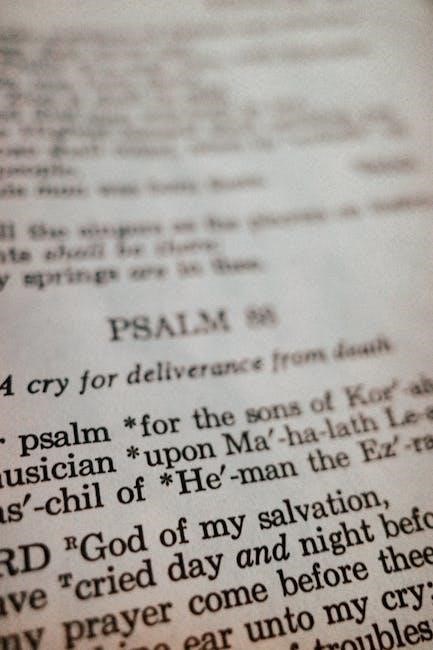Psalm 91 offers a powerful message of hope and comfort, emphasizing God’s protection and refuge for those who trust Him. Often attributed to Moses, it highlights divine deliverance from hidden and visible dangers, reassuring believers of safety under God’s shadow. Its themes of trust, faith, and spiritual warfare make it a timeless source of encouragement, promising peace amidst life’s challenges.
1.1 Historical Context of Psalm 91
Psalm 91’s authorship remains unknown, though some attribute it to Moses, possibly written during Israel’s wilderness journey. Others view it as a Messianic psalm, foreseeing God’s protection over Jesus. Its historical context emphasizes trust in God’s deliverance, using imagery like a mother hen shielding her chicks. The psalm reassures believers of divine refuge from both hidden dangers and overt threats, offering comfort during crises. Its timeless relevance spans generations, making it a cherished text for spiritual encouragement and biblical study.
1.2 The Significance of Psalm 91 in the Bible
Psalm 91 holds profound significance as a declaration of God’s protection and refuge. Its vivid imagery, such as hiding under God’s wings, conveys divine care and safety. The psalm reassures believers of God’s presence in times of crisis, offering hope and comfort. Its themes of trust, deliverance, and spiritual warfare make it a cornerstone of biblical encouragement. Often linked to Messianic prophecy, it underscores God’s faithfulness and the importance of reliance on Him, resonating deeply in personal and communal worship across generations.
1.3 Overview of the Psalm’s Structure
Psalm 91 is a 16-verse composition that unfolds in three main sections. Verses 1-2 introduce the theme of God as a refuge and protector. Verses 3-13 elaborate on His deliverance from dangers, both hidden and visible, emphasizing trust in divine care. The final section, verses 14-16, promises rewards for those who trust God, highlighting intimacy with Him and divine intervention. This structure creates a vivid portrayal of God’s protection, offering reassurance and hope to believers facing life’s challenges.

Authorship and Background
Psalm 91’s authorship remains uncertain, with theories attributing it to Moses or viewing it as Messianic, prophesying Jesus’ divine protection. Its background reflects trust in God’s care.
2.1 Who Wrote Psalm 91?
Psalm 91’s authorship is debated among scholars. Some attribute it to Moses, suggesting he wrote it during Israel’s wilderness journey to comfort the people. Others believe it may be a Messianic Psalm, foretelling God’s protection over Jesus. Despite the uncertainty, its timeless themes of trust and divine refuge resonate universally, making it a cherished text for believers seeking comfort and assurance in faith.
2.2 The Debate Over Moses and Messianic Interpretations
The debate surrounding Psalm 91’s authorship centers on Moses and Messianic interpretations. Some scholars link it to Moses, viewing it as a comfort during Israel’s wilderness sojourn. Others see it as a prophecy of God’s protection over the Messiah, Jesus, during His ministry. This duality reflects its deep theological richness, offering comfort and assurance to believers across generations through its vivid imagery and promises of divine refuge and deliverance.
2.3 The Purpose of the Psalm
The purpose of Psalm 91 is to reassure believers of God’s unwavering protection and refuge in times of crisis. It aims to inspire trust and reliance on Him, emphasizing His faithfulness in delivering from both hidden and visible dangers. The psalm also serves to comfort and strengthen those facing fear or uncertainty, offering a vivid portrayal of divine safety under God’s wings. Ultimately, it seeks to deepen spiritual understanding and encourage a life of fearless trust in God’s providence and care.

Key Themes and Messages
Psalm 91 emphasizes God’s protection, trust, and deliverance, highlighting spiritual warfare and the assurance of safety, encouraging believers to live fearlessly and rely on divine refuge.
3.1 God’s Protection and Refuge
Psalm 91 vividly portrays God as a refuge and protector, offering shelter from life’s dangers. The imagery of dwelling in the “secret place of the Most High” (v.1) and under the “shadow of the Almighty” (v.1) conveys divine protection. Verses 3-4 highlight deliverance from hidden traps and arrows, while verses 5-7 assure safety from terrors, diseases, and destructions. The metaphor of hiding under God’s wings (v.4) emphasizes His care, providing believers with timeless comfort and reassurance of His presence as their ultimate refuge.
3.2 Trust and Faith in God
Psalm 91 emphasizes the importance of trusting God as the ultimate refuge and fortress. The psalmist declares, “I will say of the LORD, He is my refuge and my fortress; my God, in Him I will trust” (v.2). This trust is not passive but active, requiring faith in God’s power and promises. By trusting Him, believers find rest and peace, even in crisis. The psalm encourages voicing trust in God, ensuring His presence and care as a steadfast refuge amidst life’s challenges.
3.3 Spiritual Warfare and Deliverance
Psalm 91 addresses spiritual warfare, offering assurance of deliverance from both hidden and visible threats. Verses 3-4 highlight rescue from traps and snares, symbolizing protection from spiritual attacks. The imagery of a hen gathering her chicks underscores God’s care during danger. This psalm encourages believers to trust in divine intervention, promising safety and deliverance through faith. It serves as a powerful reminder of God’s role in overcoming spiritual battles, providing hope and reassurance in times of conflict and uncertainty.
3.4 The Promise of Safety and Security
Psalm 91 promises believers safety and security, emphasizing God’s unwavering protection. Verses 1-2 assure those who dwell in the secret place of the Most High, finding refuge under the Almighty’s shadow. This promise extends to deliverance from both hidden dangers (vv. 3-4) and visible threats (vv. 5-7), such as terrors, arrows, and diseases. The psalm’s imagery, including God’s wings and angels, reinforces His commitment to guard and uphold those who trust Him, offering peace and rest in His presence amidst life’s challenges.

Theological Insights
Psalm 91 provides rich theological insights into God’s nature, emphasizing His role as Protector and Refuge. It highlights divine attributes like omnipotence and faithfulness, offering a deep understanding of spiritual security through trust in Him. The psalm’s imagery and promises reveal God’s active involvement in believers’ lives, ensuring their safety and deliverance from all evils, thus strengthening faith and trust in His sovereign care.
4.1 The Names of God in Psalm 91
Psalm 91 prominently features the names of God, such as “Most High” and “Almighty,” emphasizing His sovereignty and power. These titles highlight God’s role as a refuge, fortress, and deliverer, showcasing His faithfulness and protection. The imagery of “dwelling in the secret place” and being “under His wings” reinforces trust in His deliverance. Such names underscore God’s divine attributes, providing comfort and assurance to believers seeking safety and security in Him. This theological emphasis strengthens faith and trust in God’s providence and care.
4.2 The Concept of “Dwelling in the Secret Place”
“Dwelling in the secret place of the Most High” signifies a deep, intimate relationship with God, where believers find refuge and protection. This concept, central to Psalm 91, invites trust and reliance on God, emphasizing a personal and abiding connection. The imagery of being under God’s shadow symbolizes His constant presence and care, offering reassurance in times of uncertainty. This theological idea encourages believers to seek a life of faith and trust, finding peace and security in God’s presence, thus living fearlessly and confidently.
4.3 The Role of Angels in Protection
Psalm 91 highlights the role of angels as divine protectors, sent by God to guard those who trust in Him. Verses 11-13 emphasize that angels are commanded to protect believers, ensuring their safety and deliverance from harm. This protection is both physical and spiritual, offering reassurance against life’s dangers. The imagery of angels lifting believers up in their hands underscores God’s care and provision, reinforcing the theme of trust and divine guardianship in times of uncertainty and fear.
4.4 The Relationship Between Faith and Fear
Psalm 91 underscores the transformative power of faith in overcoming fear. Trusting in God’s protection and refuge fosters a fearless heart, replacing anxiety with confidence. The psalmist portrays God as a shield and fortress, emphasizing His sovereignty over all dangers. By dwelling in the secret place of the Most High, believers exchange fear for peace, living fearlessly in a world filled with uncertainties. This dynamic relationship highlights how unwavering faith in God’s care silences fear and cultivates a life of trust and assurance.

Verse-by-Verse Analysis
Psalm 91 offers profound insights into God’s protection, trust, and deliverance. Each verse explores themes of divine refuge, deliverance from dangers, and the assurance of God’s presence, providing deep spiritual truths for believers.

5.1 Psalm 91:1 – The Secret Place of the Most High
Psalm 91:1 introduces the concept of dwelling in the “secret place of the Most High,” symbolizing intimacy and safety with God. This imagery, often linked to other Psalms, emphasizes trust and faith in divine protection, offering believers a spiritual refuge from life’s challenges. The verse underscores the assurance of being under the shadow of the Almighty, providing comfort and security for those who seek God’s presence. It invites believers to experience His care and provision in times of trouble.
5.2 Psalm 91:2 – Declaring Trust in God
Psalm 91:2 emphasizes the importance of declaring trust in God, stating, “I will say of the Lord, ‘He is my refuge and my fortress, my God, in whom I trust.'” This verse highlights the psalmist’s personal affirmation of faith, establishing God as their ultimate source of safety and strength. By declaring this truth, believers reinforce their trust in God’s care, especially during times of crisis. This declaration serves as a powerful expression of dependence on God, underscoring His role as a steadfast refuge and protector.
5.3 Psalm 91:3-4 – Deliverance from Hidden Dangers
Psalm 91:3-4 assures believers of God’s deliverance from hidden dangers, stating, “Surely He shall deliver you from the snare of the fowler and from the deadly pestilence.” These verses emphasize protection from unseen threats, such as traps or harmful situations. The imagery of a bird protecting its young under its wings further illustrates God’s care. This passage provides reassurance that God actively shields His people, offering both physical and spiritual safety. It encourages trust in His faithfulness, even when dangers are not immediately apparent.
5.4 Psalm 91:5-7 – Protection from Visible Threats
Psalm 91:5-7 provides assurance of God’s protection from visible threats, stating, “You shall not be afraid of the terror by night, nor of the arrow that flies by day.” These verses address overt dangers such as terrors, arrows, pestilence, and destruction, offering comfort to believers. The imagery of a hen gathering her chicks underscores God’s active care, reassuring His people of safety even in the face of clear and present dangers. This passage strengthens faith in God’s steadfast presence and deliverance.
5.5 Psalm 91:8 – The Privilege of Observing God’s Work
Psalm 91:8 declares, “You shall see the reward of the wicked.” This verse highlights the believer’s privilege to witness God’s justice and righteousness. It reassures the faithful that they will observe the fulfillment of God’s promises, both in protection and judgment. The verse emphasizes the distinction between the righteous, who trust in God, and the wicked, who face His judgment. This privilege underscores the believer’s unique position as a spectator of God’s sovereign work in the world.
5.6 Psalm 91:9-10 – The Assurance of God’s Presence
Psalm 91:9-10 affirms, “Because you have made the Lord your refuge… no evil shall befall you.” These verses provide assurance of God’s constant presence and protection. By making the Lord one’s refuge, believers are guaranteed safety from harm. The imagery reinforces the idea that trust in God leads to His unwavering care and deliverance, offering comfort and confidence in His faithfulness. This assurance strengthens faith and encourages believers to rely fully on God’s presence in all circumstances.
5.7 Psalm 91:11-13 – The Ministry of Angels
Psalm 91:11-13 highlights the ministry of angels as divine protectors, stating, “For He shall give His angels charge over you, to keep you in all your ways.” These verses emphasize God’s provision of angelic protection for believers, ensuring their safety and guidance. The imagery of angels lifting believers up on their hands to prevent stumbling underscores divine care and deliverance. This passage encourages trust in God’s supernatural provision, offering comfort and assurance of His active involvement in daily life and challenges.
5.8 Psalm 91:14-16 – The Reward of Trusting God
Psalm 91:14-16 promises profound rewards for those who trust God, declaring, “Because he has set his love upon Me, therefore I will deliver him; I will set him on high, because he has known My name.” These verses assure believers of rescue, exaltation, and intimate relationship with God. They highlight the reciprocal nature of faith, where trust in God leads to His unwavering support and honor. This conclusion reinforces the psalm’s central theme of trust and its transformative power in the believer’s life, offering eternal assurance and divine favor.

Practical Applications
Psalm 91 offers practical wisdom for believers, emphasizing trust in God during crises, the importance of prayer and meditation, and living fearlessly through faith. It encourages relying on divine protection and fostering community support for spiritual growth.
6.1 How to Trust God in Times of Crisis
Trusting God in crises begins with declaring His refuge and fortress, as seen in Psalm 91:2. Seek His presence through prayer and meditation, reminding yourself of His power and majesty. Personalize the psalm’s promises, confessing them over your life and loved ones. Trusting God means relying on His divine protection and deliverance, even when dangers are unseen. By hiding under His wings, believers find rest and peace, living fearlessly despite life’s challenges.
6.2 The Importance of Prayer and Meditation
Prayer and meditation are essential for building trust in God during crises. By seeking His presence, believers find rest and peace. Psalm 91 encourages hiding under God’s wings, a metaphor for divine protection. Regular prayer and reflection on Scripture help personalize the psalm’s promises, fostering a deeper connection with God. This spiritual practice enables believers to trust Him fully, even in uncertain times, and to live fearlessly under His shadow.
6.3 Living Fearlessly in a Fearful World
Psalm 91 inspires believers to live fearlessly by trusting in God’s protection. Verses 5-7 assure safety from terrors, arrows, and diseases, emphasizing divine deliverance. The imagery of a hen gathering chicks underscores God’s care. By abiding in the secret place, believers gain confidence to face life’s challenges without fear. This psalm encourages a bold, trusting lifestyle, reminding followers that God’s presence offers security amidst uncertainty, enabling them to live courageously in a world filled with fear and instability.
6.4 The Role of Community in Spiritual Growth
The role of community in spiritual growth is vital, as believers encourage and support one another in trusting God. Studying Psalm 91 in groups fosters shared understanding and mutual encouragement, helping individuals apply its promises. Corporate prayer and meditation deepen collective faith, while accountability within the community strengthens resolve to live fearlessly. Together, believers can observe God’s work and assure one another of His presence, creating a supportive environment for spiritual maturation and steadfast trust in divine protection.

Connection to Other Scriptures
Psalm 91 connects to Proverbs through wisdom themes and to other Psalms via imagery like hiding under God’s wings. New Testament teachings echo its trust and refuge concepts.
7.1 Links to the Book of Proverbs
Psalm 91 shares thematic connections with Proverbs, particularly in emphasizing trust and wisdom. Proverbs 3:5-6 encourages trusting the Lord, mirroring Psalm 91:2’s declaration of God as refuge; Both texts highlight divine protection, with Proverbs personifying wisdom as a protective figure (Proverbs 4:6) and Psalm 91 using imagery like hiding under God’s wings (Psalm 91:4). This reflects the wisdom of seeking refuge in God, avoiding life’s dangers, and living virtuously, aligning with Proverbs’ teachings on prudence and safety (Proverbs 22:3). These parallels underscore the importance of trusting God for protection and guidance.
7.2 Parallel Teachings in the New Testament
Psalm 91’s themes of trust and divine protection resonate in the New Testament. Jesus’ teachings on trusting God (Matthew 10:29-31) and His own reliance on the Father during His ministry and crucifixion reflect the psalm’s emphasis on refuge in God. The concept of angels as protectors (Psalm 91:11-12) aligns with New Testament teachings on their role as ministering spirits (Hebrews 1:14). Additionally, the promise of deliverance in Psalm 91:14-16 mirrors the ultimate victory Christ offers over fear and death, emphasizing trust and eternal security through Him.
7.3 The Use of Imagery in Other Psalms
The imagery in Psalm 91, such as hiding under God’s wings (v.4), is mirrored in other Psalms, like Psalm 17:8 and Psalm 36:7, which also depict divine protection. Similarly, Psalm 23’s shepherd imagery and Psalm 46’s portrayal of God as a refuge reflect the same theme of trust and safety. These recurring images emphasize God’s faithfulness and reinforce the psalmist’s message of hope and deliverance, creating a rich tapestry of trust in divine care across the Psalter.

Study Resources and Tools
Various study resources like Kenneth Copeland’s Bible, Kameel Majdali’s book, and digital guides provide deep insights into Psalm 91’s themes and applications. They include verse-by-verse analysis, study guides, and sermon series for comprehensive understanding.
8.1 Recommended Commentaries on Psalm 91
Kenneth Copeland’s Word of Faith Study Bible offers insightful commentary on Psalm 91, highlighting its promises of protection and trust in God. Kameel Majdali’s book, God’s Secret Place, provides a deeper theological exploration of the psalm’s themes. Additionally, the Elmont Bible Study PDF guide includes structured analysis, verse-by-verse breakdowns, and practical applications, making it an excellent resource for personal or group study. These commentaries enrich understanding and application of Psalm 91’s timeless truths.
8.2 Bible Study Guides and Worksheets
Bible study guides and worksheets on Psalm 91 provide structured tools for deeper engagement. Teach All Nations Inc. offers a comprehensive guide based on Kameel Majdali’s book, featuring questions tied to Scripture. The Elmont Bible Study PDF highlights Psalm 91 as a passport to a victorious life, free from fear, and includes practical steps for trusting God. These resources often connect Psalm 91’s themes to other scriptures, like Psalm 15, emphasizing living in God’s presence and facing challenges with confidence. Digital formats like PDFs make verse-by-verse analysis and reflection accessible for personal or group study, encouraging memorization and prayer.
8.3 Sermons and Teachings on Psalm 91
Sermons and teachings on Psalm 91 emphasize its powerful message of trust, protection, and divine deliverance. Preachers like Kenneth Copeland highlight the psalm’s promises of safety and refuge, encouraging believers to personalize its verses for protection. Kameel Majdali’s teachings explore the psalm’s depth, linking it to broader biblical themes of faith and God’s sovereignty. These resources often include practical applications, such as living fearlessly and trusting God in crises, making them invaluable for spiritual growth and inspiration.

Personal Reflection and Devotion
Psalm 91 invites personal reflection through journaling, memorization, and prayer. It encourages believers to dwell in God’s presence, trust His protection, and live fearlessly, fostering deeper intimacy with Him.
9.1 Journaling Through Psalm 91
Journaling through Psalm 91 helps deepen personal reflection and connection with God. Write down key verses, such as Psalm 91:1-2, and reflect on their meaning. Note how each verse applies to your life, identifying areas where you can trust God more deeply. Record prayers, praises, and insights gained. This practice fosters intimacy with God, helping you memorize the Psalm and apply its promises of protection and peace. Regular journaling can also track spiritual growth and reinforce faith in God’s steadfast care.
9.2 How to Memorize the Psalm
Memorizing Psalm 91 can be achieved through consistent practice and engaging techniques. Break the Psalm into manageable sections, focusing on one verse at a time. Repeat each verse multiple times daily, using flashcards or writing them down. Reading aloud and visualizing the imagery, such as “hiding under God’s wings,” enhances retention. Set specific goals, like memorizing one verse per day, and track progress. Teaching the verses to others or incorporating them into prayers can also reinforce memory and deepen understanding of God’s promises.
9.3 Incorporating Psalm 91 into Daily Prayer
Incorporate Psalm 91 into daily prayer by personalizing its verses, declaring God’s promises over your life and loved ones. Begin by acknowledging God as your refuge and fortress, then pray through specific protections, such as deliverance from hidden dangers or visible threats. Use the imagery of dwelling in the secret place and trust in God’s care. Conclude by thanking Him for His faithfulness and asking for a deeper revelation of His presence. This practice strengthens faith and fosters a sense of security in God’s provision.
Psalm 91 is a timeless source of comfort, offering promises of protection, trust, and divine care. Its verses inspire faith, reassure of God’s presence, and provide practical wisdom for living fearlessly, making it a cherished text for personal reflection and communal worship across generations.
10.1 Summarizing the Key Takeaways
Psalm 91 underscores God’s unwavering protection, refuge, and deliverance for those who trust Him. It emphasizes living fearlessly, trusting God in crises, and finding peace in His presence. The psalm highlights divine sovereignty, reassures believers of safety, and inspires spiritual growth through prayer and community. Its timeless relevance encourages believers to abide in God’s shadow, relying on His faithfulness and provision. These teachings remain a profound source of hope, guiding followers to embrace a life rooted in faith and trust in the Almighty.
10.2 Encouragement for Further Study
Psalm 91 invites deeper exploration through personal reflection, prayer, and communal discussion. Utilize study guides, commentaries, and sermons to uncover its riches. Journaling and memorization can enhance your connection to its promises. Explore its links to other Scriptures, such as Proverbs and New Testament teachings, to broaden your understanding. Embrace the challenge to live fearlessly, trusting God’s protection and provision. Let this psalm inspire a lifestyle of faith, prayer, and confidence in God’s unwavering care.
10.3 The Timeless Relevance of Psalm 91
Psalm 91 remains a timeless source of comfort and strength, offering universal truths about God’s protection and refuge. Its imagery of divine shelter resonates across generations, providing hope in crisis and reassurance of God’s presence. The psalm’s themes of trust and deliverance are as relevant today as they were centuries ago, making it a vital part of spiritual growth and daily prayer. Its promises transcend time, inviting believers to abide in God’s shadow and live fearlessly in a world filled with challenges and uncertainties.
